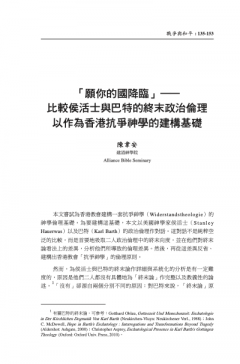「願你的國降臨」——比較侯活士與巴特的終末政治倫理以作為香港抗爭神學的建構基礎/陳韋安
陳韋安
撮要
巴特在尚未出版的《教會教義學》(Kirchliche Dogmatik)第四冊第四部分 (後來修訂成為《基督徒生活》﹝Das Christliche Leben﹞一書)以主禱文的第三句「願你的國度降臨」展示一套教會政治神學的倫理—— 教會的禱告與抗爭行動並沒有相衝突,反而是在終末的角度下被視為不可分割的事情。在政治倫理的課題上,侯活士(Stanley Hauerwas)在2007年出版的寫作《馬太福音神學詮釋》中, 同樣提及「願你的國度降臨」在政治倫理上關聯,並且在其他著作上建構出一套獨有的教會政治倫理。本文在「願你的國度降臨」這禱告—行動的框架上,比較巴特與侯活士政治倫理的差別,並嘗試找出兩位神學家在政治倫理在終末向度上 的差異—— 上帝國度、上帝公義與人的國度、人的公義之間的張力如何在「願你 的國度降臨」的禱告中被理解?筆者相信,正正基於兩者政治倫理的終末導向的不同,造成巴特與侯活士對教會抗爭立場上的不同。筆者更希望,這討論能夠有助當代香港教會抗爭神學(Widerstandstheologie)的建構。
ABSTRACT
Karl Barth’s unpublished portion of Kirchliche Dogmatik , § 78 The Struggle for Human Righteousness, constructs a political ethics based on the third petition of the Lord’s prayer “Thy kingdom come” — the prayer of the church and the action of resistance do not contradict, but should not viewed as one in an eschatological perspective. Stanley Hauerwas’s Matthew wrote in 2007 also provides a political-ethical meaning for “Thy kingdom come,” with which Hauerwas develops his own political ethics of the church. In this framework of the action-prayer relationship of “Thy kingdom come,” this paper aims at comparing the difference of political ethics between Hauerwas and Barth — how should the tensions between the kingdom of God and humanity, the righteousness of God and humanity be understood in the prayer “Thy kingdom come”? I believe: the discrepancy of the standpoints between Hauerwas and Barth on “resistance” is based on the eschatological difference of their political ethics — the clarification of this issue would help to construct and develop a Widerstandstheologie of Hong Kong.
原載於《建道學刊》46期(2016年7月),頁 135-154。
作者簡介
陳韋安
神學系副教授








